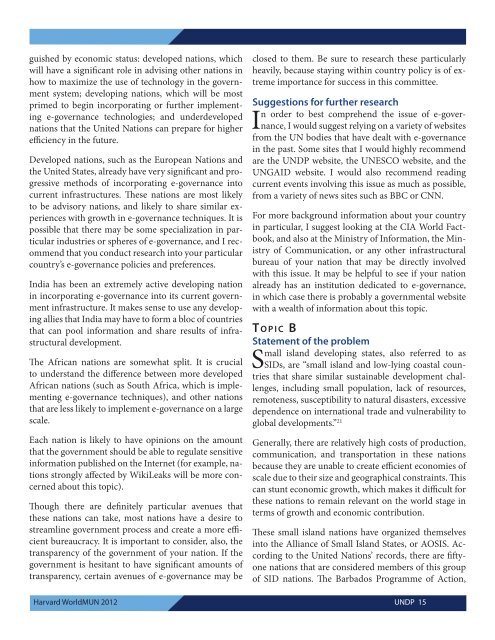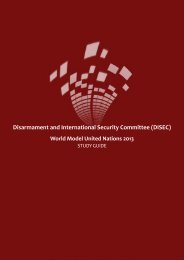Study Guide - World Model United Nations
Study Guide - World Model United Nations
Study Guide - World Model United Nations
You also want an ePaper? Increase the reach of your titles
YUMPU automatically turns print PDFs into web optimized ePapers that Google loves.
guished by economic status: developed nations, which<br />
will have a significant role in advising other nations in<br />
how to maximize the use of technology in the government<br />
system; developing nations, which will be most<br />
primed to begin incorporating or further implementing<br />
e-governance technologies; and underdeveloped<br />
nations that the <strong>United</strong> <strong>Nations</strong> can prepare for higher<br />
efficiency in the future.<br />
Developed nations, such as the European <strong>Nations</strong> and<br />
the <strong>United</strong> States, already have very significant and progressive<br />
methods of incorporating e-governance into<br />
current infrastructures. These nations are most likely<br />
to be advisory nations, and likely to share similar experiences<br />
with growth in e-governance techniques. It is<br />
possible that there may be some specialization in particular<br />
industries or spheres of e-governance, and I recommend<br />
that you conduct research into your particular<br />
country’s e-governance policies and preferences.<br />
India has been an extremely active developing nation<br />
in incorporating e-governance into its current government<br />
infrastructure. It makes sense to use any developing<br />
allies that India may have to form a bloc of countries<br />
that can pool information and share results of infrastructural<br />
development.<br />
The African nations are somewhat split. It is crucial<br />
to understand the difference between more developed<br />
African nations (such as South Africa, which is implementing<br />
e-governance techniques), and other nations<br />
that are less likely to implement e-governance on a large<br />
scale.<br />
Each nation is likely to have opinions on the amount<br />
that the government should be able to regulate sensitive<br />
information published on the Internet (for example, nations<br />
strongly affected by WikiLeaks will be more concerned<br />
about this topic).<br />
Though there are definitely particular avenues that<br />
these nations can take, most nations have a desire to<br />
streamline government process and create a more efficient<br />
bureaucracy. It is important to consider, also, the<br />
transparency of the government of your nation. If the<br />
government is hesitant to have significant amounts of<br />
transparency, certain avenues of e-governance may be<br />
Harvard <strong>World</strong>MUN 2012<br />
closed to them. Be sure to research these particularly<br />
heavily, because staying within country policy is of extreme<br />
importance for success in this committee.<br />
Suggestions for further research<br />
In order to best comprehend the issue of e-governance,<br />
I would suggest relying on a variety of websites<br />
from the UN bodies that have dealt with e-governance<br />
in the past. Some sites that I would highly recommend<br />
are the UNDP website, the UNESCO website, and the<br />
UNGAID website. I would also recommend reading<br />
current events involving this issue as much as possible,<br />
from a variety of news sites such as BBC or CNN.<br />
For more background information about your country<br />
in particular, I suggest looking at the CIA <strong>World</strong> Factbook,<br />
and also at the Ministry of Information, the Ministry<br />
of Communication, or any other infrastructural<br />
bureau of your nation that may be directly involved<br />
with this issue. It may be helpful to see if your nation<br />
already has an institution dedicated to e-governance,<br />
in which case there is probably a governmental website<br />
with a wealth of information about this topic.<br />
t o p i C B<br />
Statement of the problem<br />
Small island developing states, also referred to as<br />
SIDs, are “small island and low-lying coastal countries<br />
that share similar sustainable development challenges,<br />
including small population, lack of resources,<br />
remoteness, susceptibility to natural disasters, excessive<br />
dependence on international trade and vulnerability to<br />
global developments.” 21<br />
Generally, there are relatively high costs of production,<br />
communication, and transportation in these nations<br />
because they are unable to create efficient economies of<br />
scale due to their size and geographical constraints. This<br />
can stunt economic growth, which makes it difficult for<br />
these nations to remain relevant on the world stage in<br />
terms of growth and economic contribution.<br />
These small island nations have organized themselves<br />
into the Alliance of Small Island States, or AOSIS. According<br />
to the <strong>United</strong> <strong>Nations</strong>’ records, there are fiftyone<br />
nations that are considered members of this group<br />
of SID nations. The Barbados Programme of Action,<br />
UNDP 15

















